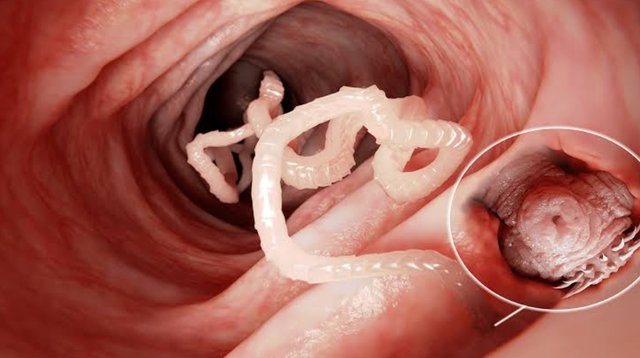Tapeworm Infestation: How To Get Rid Of It

Some people think tapeworms only affect animals. But while these infections can occur in cows and pigs, it isn’t an animal-specific condition. Tapeworms can also infect humans, although it’s not a common infection.
The Centers for Disease Control and Prevention (CDC) estimates there are less than 1,000new tapeworm infections in humans in the United States each year.
Tapeworms are flat worms that can live in the intestines. Humans can get these worms after eating the undercooked meat of an infected animal. This includes infected pork, beef, or fish.
Dogs and cats can also get tapeworms, but their infections rarely pass to humans. Oftentimes, dogs and cats get an infection after swallowing a parasite-contaminated flea.
Treatment for tapeworms in humans
It’s important to note that some tapeworm infections don’t require treatment. Sometimes, the tapeworm leaves the body on its own. This is why some people never have symptoms or only have mild symptoms.
If a tapeworm doesn’t leave your body, your doctor will recommend a treatment based on the type of infection.
For an intestinal infection, you’ll need to take an oral medication to get rid of the tapeworm. Antiparasitic drugs used to treat intestinal infections may include:
- praziquantel (Biltricide)
- albendazole (Albenza)
- nitazoxanide (Alinia)
After completing treatment, you’ll have a follow-up stool sample to ensure the infection has cleared.
If you have an invasive infection and the tapeworm forms a cyst or a lump, your doctor may prescribe an anthelmintic drug to shrink the mass. This is a type of antiparasitic medication. Sometimes, doctors recommend surgery to remove a large cyst or lump.
Your doctor may prescribe a corticosteroid (Prednisone) if inflammation develops in your organs or tissues. An antiseizure medication may be prescribed if the infection affects your brain or central nervous system, thus triggering a seizure.
An invasive infection can also cause fluid buildup in the brain. A shunt placement can be used to drain fluid.
Getting early treatment for a tapeworm infection may reduce the likelihood of complications such as a digestive blockage. A large-sized tapeworm may block the appendix, bile ducts, or pancreatic duct. This may reduce organ function and blood supply.
Do home remedies work for tapeworms?
Even though oral medications are effective for tapeworms, there’s research suggesting that some natural and home remedies can also fight intestinal worms.
In one study, different dosages of papaya seed infusions and varied amounts of whole papaya seeds were given to chickens infected with intestinal parasites. After two weeks of treatments, the chickens treated with the papaya seeds had a significantly lower number of intestinal worms.
In addition to papaya seeds, there are also claims of other natural dewormers. These include garlic, pumpkin, and ginger. These herbs have had antiparasitic effects in some animals, but more research is needed to confirm the benefits in humans.
If you’re thinking about using a natural or home remedy for tapeworms, consult your doctor for dosing information.
Symptoms of tapeworms in humans
If you ingest food or water contaminated with a tapeworm or its eggs, the parasite can travel to your intestines and cause different symptoms.
A tapeworm infection can go undiagnosed because some people don’t have any symptoms of an infection or they only experience mild symptoms. When symptoms do occur, they often include:
- nausea
- loss of appetite
- abdominal pain
- dizziness
- diarrhea
- weight loss
- weakness
Even though tapeworms can travel to the intestines, they can also migrate to other parts of the body and cause organ or tissue damage. This is known as an invasive infection. You might experience additional symptoms.
Some people with an invasive infection develop:
- headaches
- seizures
- a cyst or lump
If a tapeworm cyst ruptures, you may have symptoms of an allergic reaction like hives and itchiness.
See your doctor if you develop any of the above symptoms. They can conduct tests and make a diagnosis.
What’s the outlook?
Even though a tapeworm infection can cause abdominal discomfort, many infections don’t cause serious complications.
In fact, you may have a tapeworm infection and not even know it, especially if the tapeworm exits your body on its own.
If your doctor confirms you have a tapeworm infection, follow their instructions to lessen the risk of complications. If left untreated, there’s the risk of developing an invasive infection which can affect your tissue and organs. This can lead to brain swelling, inflammation, and intestinal blockage.
How to prevent tapeworms in humans
Tapeworm infections are preventable. Prevention starts with good hygiene. Always wash your hands after using the bathroom and before handling food.
The proper way to wash your hands is with warm soapy water. Lather the soap and rub your hands together for 20 seconds. This is roughly the length of singing the “Happy Birthday” song twice, says the CDC.
You can also protect yourself by washing fruits and vegetables before eating. Additionally, make sure meat is completely cooked before consuming. Eating raw or undercooked pork, beef, or fish raises the risk of infection.
THANKS FOR READING!
🏥💙♨
Posted from myAirClinic Healthcare App. Download Android Version from PLAYSTORE!
I got a giveworm I gain weight instead of lose it..
Was not knowing it . Thanks for the information . These warms are really dangerous!
Posted using Partiko Android